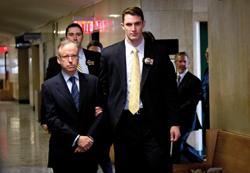Prosecution says improper Dewey adjustments boosted revenue by 10 percent, assets by 1,000 percent

Steven Davis arrives in handcuffs for the arraignment at Manhattan Criminal Court in March 2014. Photo by Reuters Carlo Allegri from the February 2015 ABA Journal.
As the prosecution case against three former leaders accused of cooking the books at Dewey & LeBoeuf nears its conclusion, witnesses are providing an overview of claimed financial wrongdoing that led to the law firm’s demise.
Attempting to stay in compliance with the terms of $250 million in debt and portray the law firm as an attractive lending prospect to banks and investors, Dewey’s ex-chairman, Steven Davis, former chief financial officer, Joel Sanders, and former executive director, Stephen DiCarmine, allegedly resorted to fraud. They oversaw an accounting program between 2008 and 2012 that inflated the firm’s income by as much as 10 percent annually, a witness said, and boosted the value of net assets, at one point, by over 1,000 percent, reports the Wall Street Journal (sub. req.).
Testifying Wednesday in the Manhattan Supreme Court case, forensic accountant Jonathan Vanderveen, who is a managing director at Alvarez & Marsal, told jurors about a series of financial adjustments said by prosecutors to be improper. They included describing payments to salaried lawyers as partner distributions and using the wrong exchange rate to determine the value of bills paid in foreign currency. The firm was required to maintain cash flow to stay in compliance with bank debt covenants.
Specifically, about 10 such adjustments annually allowed the firm to boost its net revenue by $19 million in 2009, $23 million in 2010 and $20.7 million in 2011, Vanderveen testified.
However, counsel for the defendants, who deny any wrongdoing, pointed to Vanderveen’s limited role as a summary witness who was not supposed to offer an expert opinion on what happened, reports the Am Law Daily (sub. req.).
Attorney Andrew Frisch, who represents Sanders, zeroed in during cross-examination on charts prepared by Vanderveen.
“They do not say whether any particular adjustment is right or wrong but instead they compile certain information in summary. Is that fair?” asked Frisch. Vanderveen agreed the attorney was correct. He also agreed that prosecutors instructed him about his work and charts.
Throughout the trial, which seeks to hold firm leaders criminally accountable for Dewey’s demise, the government hasn’t called any accounting expert, the Am Law Daily says. The firm filed for Chapter 11 bankruptcy in May 2012, in what the Wall Street Journal describes as the largest law firm failure ever in the United States.
Now in its fourth month, the case is likely to go to the jury around Sept. 18, another Am Law Daily (sub. req.) article reports. The prosecution is expected to rest its case before the end of the week.
The New York Law Journal (sub. req.) also has a story about recent testimony in the case.
Related coverage:
ABAJournal.com: “Judge OKs criminal case against former Dewey leaders, grants separate trial to lower-level worker”
ABAJournal.com: “Former Dewey employee testifies he reclassified money paid to firm chairman”
ABAJournal.com: “Dewey inflated invoices to make revenue look higher, former billing director testifies”



